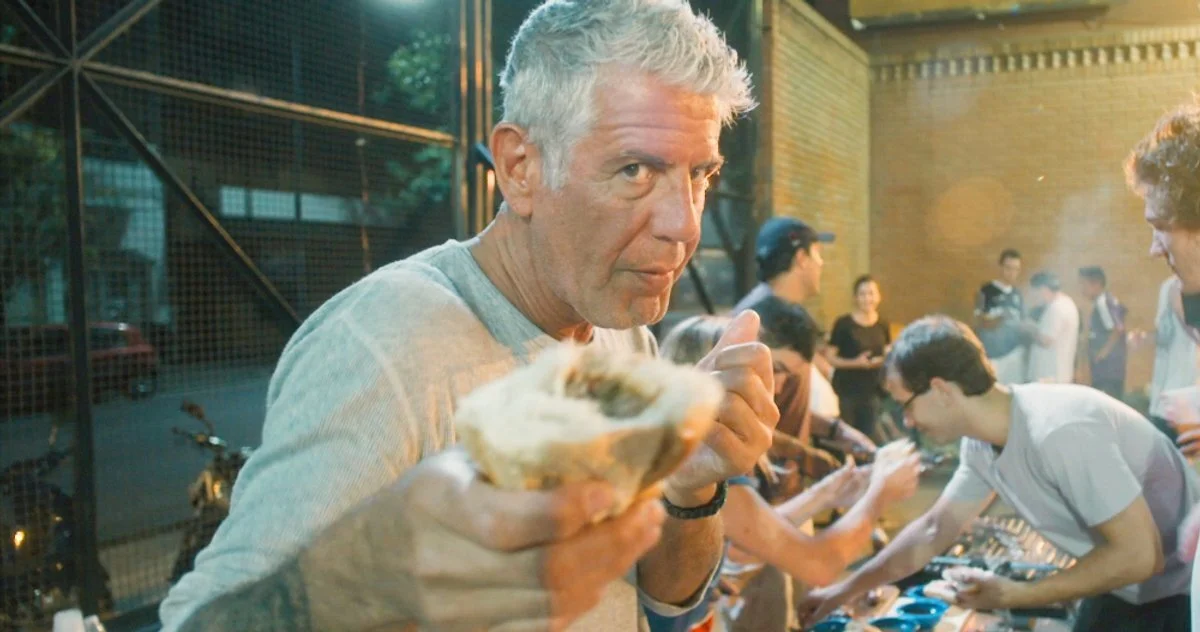ROADRUNNER: A FILM ABOUT ANTHONY BOURDAIN
Directing: C+
Writing: C+
Cinematography: B
Editing: C
My take on this Roadrunner documentary about Anthony Bourdain may be a little unexpected, or at least unusual. It starts with the event the film predictably ends with: his suicide. One of the many associates of Bourdain interviewed for the film comments on how celebrities who kill themselves inevitably wind up revered, given mural treatments and talked about “like they’re gods.” Director Morgan Neville then cuts right to, of course, a wall mural of Anthony Bourdain.
These sorts of artistic portraits of prominent cultural figures keep them at arms length, making it impossible to see them for who they really were. After seeing Roadrunner, which presumably aims to close that gap, I hardly feel like I have any greater grasp on who Bourdain really was. And, as someone with little interest in either cooking broadly speaking or particularly reality television, I barely knew who the man was to begin with.
It is indeed unfortunate that his suicide is now by far what Bourdain is best known for—something another interview subject mentions. It’s certainly the most pertinent thing I ever knew about him. Curiously, Neville spends the majority of the film just running through the bullet points of Bourdain’s increasingly famous career. I kept wondering when we might get some insight into whatever led to his suicide. The best I could glean is that in the end, the pressure of fame just became too much for him, but the film comes to no definitive conclusions.
It’s clear that Bourdain had many people who loved him. By many accounts, he became increasingly an erratic sort of asshole in the last few years. There is little doubt that he was a nuanced man. My personal issue here is that Roadrunner failed to paint a portrait of this man in a way that made him seem all that interesting to me.
And it’s not like it’s an impossible thing to do, even for someone like me with no connection to celebrity chefs. Just last week, after all, I rather enjoyed the documentary film Wolfgang, about Wolfgang Puck. That’s a guy who fashioned a career out of his greatest passion, and that is a joy to see no matter what the passion is for. Anthony Bourdain, by contrast, first made a name for himself by revealing salacious trade secrets in the 2000 memoir Kitchen Confidential, then later gained fame by eating a litany of exotic and bizarre foods around the globe in culinary themed travel reality series.
It’s clear that Bourdain meant a lot to a lot of people, but somehow I remain . . . unconvinced. I hold no particularly negative thoughts about him; by all accounts he was complicated, maybe a good man, someone who made mistakes, someone struggling with mental health. All these things are valid. But was he something special? If he was, this movie did not work hard enough to convince me of it.
That’s the clarifying element: it’s more about this film than it is about the man himself. There are many scenes presented without context—are they scenes, or outtakes maybe, from one of his TV series?—where Bourdain is having lunch at a restaurant, or visiting a museum, having a conversation we are clearly meant to take as illuminating for them or for us, or maybe both. But I could never lose sight of the fact that we are only seeing the footage because there were cameras around. When we see Bourdain meandering around a sunny villa somewhere in Europe, with voiceover discussing a period of social withdrawal or loneliness, we are actually seeing something in which he actually is around people: the camera crew.
There’s an element of contrivance in Roadrunner that doesn’t quite sit well with me, featuring all these “intimate” scenes that are by definition anything but. When we see footage of straightforward interviews with Bourdain’s friends, family and colleagues, and they break down crying, those are authentically emotional moments. Morgan Neville tries to present other, previously recorded footage in the same way, and it doesn’t work. It certainly doesn’t help that Neville also apparently “deepfaked” some of Bourdain’s voiceover narration, which makes the idea of authenticity feel muddled at best. (What he says in these lines are words he actually wrote; he just never was recorded saying them.) And sure, plenty of documentaries use voiceover narration reciting things a deceased subject of the film said or wrote, but it is typically very clear that we are not listening to a literal recording of the subject’s voice.
A lot of work went into this film otherwise, which I can respect. Plenty of people are also quite taken with the film (it has a score of 80 on MetaCritic), which I can also respect. The movie just didn’t do it for me.
You want to be force fed this stuff?
Overall: C+

